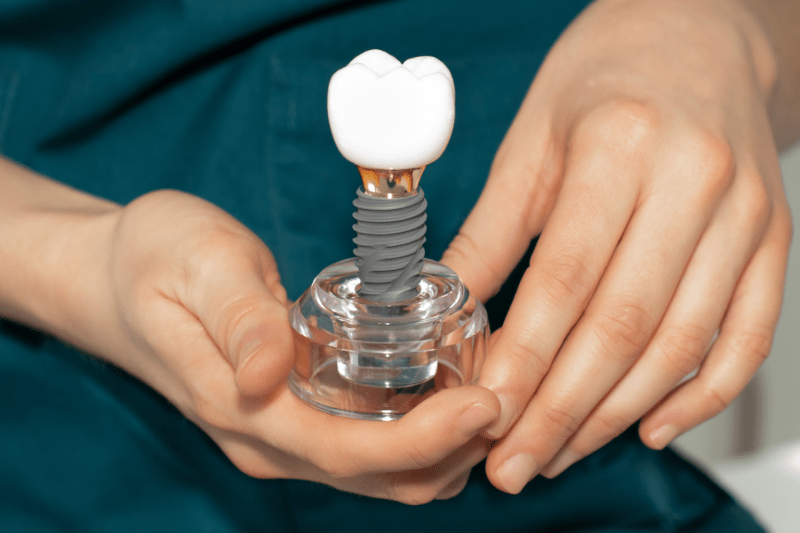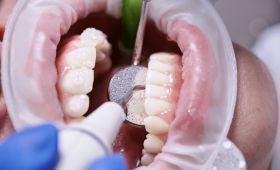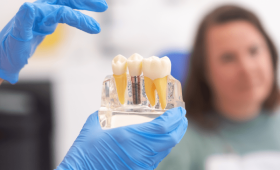What is a Dental Implant?
A dental implant is an artificial tooth root, typically made of titanium, placed into the jawbone to replace missing teeth. This small screw-shaped implant restores the chewing function like natural teeth while also providing an aesthetic appearance. Implants form a strong foundation for the attachment of dental prostheses such as crowns, bridges, or dentures. Thanks to titanium’s biocompatibility with the body, the implant fuses with the jawbone, offering a permanent solution.
Who Can Get Dental Implants?
One of the most important conditions for getting dental implants is being in good general health and having sufficient jawbone density to support the implant. In addition, healthy gums are critical for a successful implant treatment. Individuals with chronic conditions such as diabetes or heart disease must have these conditions under control. Your implant surgeon will decide if you are a suitable candidate for an implant after a detailed examination and imaging (such as a panoramic X-ray or dental tomography).
Is Implant Surgery Painful?
There is no pain felt during implant surgery, as the procedure is usually performed under local anesthesia. This numbs only the area to be operated on, and the patient feels no pain during the procedure. After the surgery, a mild ache or discomfort may occur, which is easily controlled with painkillers prescribed by the doctor. Patients can usually return to their normal activities within the first few days.
How Long Does the Surgery Take?
The surgery to place a single dental implant is usually quite fast and takes approximately 30 to 60 minutes. However, if additional procedures like bone grafting are needed before the operation or if multiple implants are planned, the surgery time may be extended. Therefore, the total duration of the surgery varies depending on the complexity of the procedure and the number of implants.
How Long Does the Recovery Process Take?
The process of the dental implant completely fusing with the jawbone, known as osseointegration, generally takes between 3 to 6 months. During this period, no pressure is applied to the implant. After the healing process is complete, a second stage is initiated to place the prosthetic tooth. If additional procedures like bone grafting were performed, this process may take even longer. Full recovery varies depending on personal factors and general health.
Is There an Age Limit for Getting Implants?
The minimum age limit for getting an implant is the completion of jawbone development. This is generally accepted as 18 years of age and older. Performing an implant on individuals who have not completed their development can lead to problems due to changes in the jaw structure. There is no upper age limit. As long as the patient is in good general health and a chronic illness is under control, implant treatment can be successfully applied at advanced ages.
What is the Lifespan of Implants?
When properly placed and cared for, dental implants can last a lifetime. This is possible with regular and good oral hygiene care, just like with natural teeth. Regular brushing, flossing, and periodic dental check-ups are very important to extend the life of the implant. Quality materials and a correct surgical procedure form the basis of a long-lasting implant.
What Factors Affect Implant Prices?
Implant prices vary depending on many factors. The most important of these are the brand and quality of the implant used, the number of implants to be placed, whether additional procedures (like bone grafting, sinus lifting) are needed, the doctor’s experience, and the clinic’s location. Therefore, to get a definitive price, a detailed examination and a treatment plan must be created.
What If the Bone Is Insufficient for Implants?
If there is insufficient bone volume in your jaw to support the implant, a procedure called bone grafting (bone augmentation) is performed. With this procedure, bone tissue taken from another part of the body or synthetically produced is added to the jawbone. Similarly, if there is insufficient bone volume in the upper jaw, a procedure called sinus lifting (sinus augmentation) raises the sinus cavity to create bone. These additional procedures form a solid foundation for the implant.
Can Implants Be Rejected by the Body?
The main material used in today’s implants, titanium, is a substance that is biocompatible with the body, and therefore, a true rejection case is very rare. Implant failure is usually caused by reasons such as smoking, poor oral hygiene, uncontrolled diabetes, or infections around the implant. In case of failure, the implant is removed, and after the area is expected to heal, a new implant can be placed.
Can an Implant Be Placed Immediately After Tooth Extraction?
Yes, under suitable conditions, an implant can be placed immediately after tooth extraction. This procedure is called “immediate implant”. However, for this method to be applied, certain criteria must be met, such as the absence of infection in the extraction site, sufficient bone volume, and healthy gums. This method shortens the treatment time and provides comfort to the patient, but it is not suitable for every case.
Can a Tooth Be Placed Immediately on the Implant?
Placing a tooth immediately on the implant is a procedure known as “immediate loading”. This is preferred especially for patients with aesthetic concerns due to tooth loss in the front area. However, the tooth placed in this case is usually a temporary prosthesis, and the permanent dental prosthesis is placed after the implant is expected to fully fuse with the bone. This method depends on the stability of the implant and the quality of the jawbone.

How Should Implants Be Cared For?
The care of dental implants is almost the same as the care of natural teeth. To extend the life of a successful implant, it is essential to brush your teeth at least twice a day, clean the area around the implant using dental floss or interdental brushes, and go for regular dental check-ups. Good oral hygiene keeps the tissues around the implant healthy and prevents possible infections.
Do Swelling and Bruising Occur After Implant Surgery?
It is normal for mild to moderate swelling and bruising to occur in the operated area after implant surgery. This is a reaction that occurs due to the nature of the surgery and usually reaches its peak within a few days, then gradually decreases. Applying a cold compress from the outside and keeping the head elevated during the first 24 hours helps to reduce swelling and discomfort.
Does Smoking Affect Implant Success?
Yes, smoking is one of the most important factors that negatively affects implant success. Smoking restricts blood flow, which slows down the healing process in the jawbone and makes it difficult for the implant to fuse with the bone. It also disrupts the balance of bacteria in the mouth, increasing the risk of infection (peri-implantitis) around the implant. Therefore, quitting smoking before and after implant treatment is a must for a successful outcome.
Do Implants Trigger Metal Detectors?
Dental implants do not trigger metal detectors at airports or other security devices. The main reason for this is that the titanium used to make implants is very light and does not have magnetic properties. The size and metal content of an implant are not large enough to trigger the sensitivity of detectors, so there is no need to worry.
Should Implants or Bridges Be Preferred for a Single Missing Tooth?
For a single missing tooth, an implant is generally a better option than a bridge. While a bridge requires the two healthy teeth on either side of the missing tooth to be reduced to support the prosthesis, implant treatment is placed only in the place of the missing tooth without harming adjacent teeth. This both preserves the health of natural teeth and offers a more long-lasting and aesthetic solution.
How Many Stages Does Implant Surgery Consist Of?
Implant surgery generally consists of two main stages. The first stage is the placement of the implant in the jawbone under local anesthesia. This stage is followed by a waiting period for the implant to fuse with the bone. In the second stage, after healing is complete, an impression is taken for the prosthetic tooth to be placed on the implant, and the permanent crown or bridge is placed. In some cases, single-stage surgery can also be applied.
What Material Are Implants Made Of?
Dental implants are most commonly made of biocompatible titanium. Titanium has excellent compatibility with the human body and easily fuses with the jawbone. Therefore, it is a reliable material in implant treatment. Besides titanium, zirconium-based implants are also becoming increasingly popular for patients with aesthetic concerns. Zirconium is a white ceramic material and is a good alternative for those with a metal allergy.
What is Done in Case of an Implant Failure?
If an implant fails, it is usually removed through a surgical procedure. After the implant is removed, if there is an infection, it is cleaned and the area is left to heal. After the healing process is complete, if the bone structure is suitable, a new implant can be placed in the same area or the area can be strengthened with additional procedures like bone grafting to prepare a suitable ground for a new implant.
What Should Be Eaten and Drunk After Implant Surgery?
In the first few days after the surgery, it is recommended to consume soft, warm, and easy-to-chew foods. Very hot or cold food and drinks should be avoided. Foods like purees, soups, yogurt, and ice cream are ideal. Drinking plenty of water is important to support the healing process. Hard and spicy foods that can irritate the surgical area should be avoided.
When Is the Best Time to Get an Implant?
The best time to get an implant is as soon as possible after tooth loss. This is because the jawbone in the edentulous area begins to resorb over time. This bone loss may require additional and more complex procedures (such as bone grafting) for future implant treatment. An implant offers a permanent solution, both aesthetically and functionally, as soon as possible.
What Are the Advantages of Dental Implant Treatment?
Dental implant treatment has many important advantages. Among the most prominent benefits are giving a natural tooth feel and fully restoring chewing function. It does not harm adjacent teeth, which means it does not require the reduction of healthy teeth as in traditional bridges. It also helps to prevent jawbone resorption, preserving the facial structure and providing an aesthetically natural smile.
Does Everyone Who Gets an Implant Get the Same Type of Prosthesis?
No, not everyone who gets an implant gets the same type of prosthesis. The type of prosthesis to be used is determined according to the number of missing teeth and the patient’s needs. A crown can be used for a single missing tooth, a bridge for multiple missing teeth, or a special denture can be used to fix removable dentures in edentulous jaws. All these prostheses are specially designed to suit the person’s oral structure and aesthetic expectations.
Is Implant Treatment Suitable for Everyone?
Implant treatment is generally suitable for most individuals who are in good health and have sufficient bone density. However, it may not be suitable for patients with uncontrolled diabetes, serious heart disease, immune system problems, or those undergoing chemotherapy/radiotherapy treatment. Therefore, a detailed evaluation of your entire health history is necessary before starting treatment.
Is Gum Contouring Necessary After an Implant?
In some cases, gum contouring (gingivoplasty) may be necessary after an implant. This procedure is the reshaping of the gum tissue around the implant to give the prosthesis a more natural and aesthetic appearance. Gum contouring increases the aesthetic success of the implant and ensures that the gum blends harmoniously with the prosthesis.
How Long Does Implant Treatment Take to Complete?
Implant treatment can take a total of several months to a year. This period includes all stages, such as the placement of the implant, the process of waiting for it to fuse with the bone, and the preparation and placement of the prosthesis. If additional procedures such as bone grafting or sinus lifting are required, the treatment time is extended. This long process is vital for the treatment to be permanent and successful.
Can Implants Support Removable Dentures?
Yes, implants provide an excellent solution for securing removable dentures. Especially in patients with complete tooth loss, traditional removable dentures are made stable by placing 2 or 4 implants. This prevents the denture from sliding in the mouth, increases chewing power, and provides the patient with more comfort and confidence. These types of treatments significantly improve patients’ quality of life.

How Often Should Check-Ups Be Done After an Implant?
Regular check-ups are of great importance for the long-lasting success of implant treatment. It is recommended to visit the dentist for a check-up, usually once every 6 months or once a year, with more frequent visits in the first year. In these check-ups, the condition of the implant, the health of the surrounding gum, and the adequacy of oral hygiene are evaluated. Problems that are diagnosed early can be easily resolved.
Can Implant Surgery Be Performed with Local Anesthesia?
Yes, most implant surgeries can be successfully performed with local anesthesia. Local anesthesia only numbs the area to be operated on, so the patient remains awake but does not feel any pain. This provides a safer and more comfortable experience for patients. In rare cases where local anesthesia is not sufficient, general anesthesia or sedation may be preferred.
In Which Countries Can I Get Cheap Dental Implant?
It is possible to get dental implants very cheaply from countries such as Hungary, croatia, czech republic and mexico. However, there are some points that you should pay attention to when getting dental implant. The quality of the dental implant is also important. In the continuation of our content, we also included an information explaining the importance of getting quality dental implants. For this reason, you should not immediately decide on the country where you will buy dental implants and read the rest of our article.
Dental Implant In Hungary
Hungary is one of the preferred countries for dental implants. However, it cannot be said that every clinic is successful, there are some really unsuccessful clinics in Hungary. Finding a good clinic for you can be quite difficult. At the same time, in terms of price, it is definitely not a place to be preferred, it only provides 40% savings compared to the United Kingdom.
Dental Implant In Croatia
Croatia is not a recommended location for dental implants. It is a country that has not proven its success. The people of Croatia prefer other countries instead of being implant in their own country. At the same time, it can not be said that it is very affordable in terms of price, it provides only 45% savings compared to the United Kingdom.
Dental Implant In Czech Republic
The Czech Republic is a country that has not been able to show itself in the field of health. It provides fairly inexpensive treatments. However, it is open to debate whether they do not develop in the field of health and whether they provide successful treatments for them. For this reason, if you are considering opting for dental implants. You need to do a very good research. Their prices save 55% compared to the United Kingdom.
Dental Implant In Mexico
Mexico has started to make a name for itself in health tourism in recent years. However, the dangerous nature of the country has also led to the proliferation of illegal clinics. At the same time, the distance from towns to cities is quite far, so it is not a preferred location for dental implants. Patients who want to choose should make sure that the clinic works legally. Mexico’s savings rate is 60%.
Dental Implants In Turkey
Turkey is a country with a very low cost of living. The high exchange rate in recent years provides a great advantage for patients coming from abroad. In addition to giving better treatments compared to many countries, it also provides cheaper treatments compared to many countries. Compared to the United Kingdom, it is possible to save up to 70% on dental implants.
Dental Implants Costs In Turkey
Turkey saves much more than other countries. At the same time, as we mentioned above, the low cost of living in the country and the high exchange rate ensure that the patients coming to the country meet their needs such as travel, accommodation and food at very affordable prices, keeping their non-treatment expenditures at a minimum.
For this reason, it is seen as the best country to get dental implants. As cure Holiday, we offer the best implants in the market for only 150 euros. Our aim is not to earn money, but to continue the life of patients with comfortable and high quality teeth.
For this reason, we provide treatment to patients without adding a price on top of the implant prices. There is also the possibility of discounting prices for more than one person or for more than one tooth. You can reach us for affordable treatments in Turkey’s best clinics.
Getting Quality Dental Implant Why Is It Important?
Dental implants are a very demanding procedure. Since it is a condition that requires surgery, it is also important that the preferred clinic attaches importance to hygiene. It is also important that the implant brands used are original. After the use of non-original implants, you can suffer a lot. You may have to remove the implant. It is important that the implant is compatible with the tooth, and the use of state-of-the-art devices in the clinical laboratory is important for your dental prosthesis to be suitable for the size of your mouth.
Dentures that are incompatible with your dental dimensions may cause you to feel pain while eating and talking. At the same time, tooth sensitivity will be inevitable due to permanent tooth damage after a poor quality treatment.
Both Quality And Affordable Implant In Turkey
Yes, Turkey provides both services at the same time. The country is very developed in the field of health, so it is possible to get very successful dental implants at very affordable prices. In recent years, Turkey has made such a name for itself in health tourism, thanks to its successful treatments. There are thousands of tourists from all over the world who come to Turkey for treatment. And the country’s treatment success rate is also quite high. Instead of risking your health by choosing other countries, you can get safe, successful and affordable treatment in Turkey.
Are Dental Clinics In Turkey Reliable?
Getting treatment in the country is safe. But of course, as in every country, there are clinics that should not be treated. The only difference in Turkey is that the number of these clinics is very low. At the same time, it will be more advantageous for you if you ask the clinic where you will receive treatment in Turkey whether they work with a health tourism authorization certificate. Because the Turkish government has given this document to some clinics so that patients from abroad can receive better quality treatments and it checks them every 6 months. Thus, it is proven that the clinic you receive treatment provides quality and successful treatments.
Which Location Is Preferred For Dental Implant In Turkey?
As Cure Holiday, we have gathered together the best quality clinics in the locations most visited by tourists for our patients. You can get treatment in holiday locations such as Istanbul, Izmır, Antalya, Kusadasi Same time No commission or additional fee is charged from the patients.
The Republic of Turkey pays a commission per patient because we provide foreign currency inflows. This payment is made by the Turkish state. It does not reflect on you in any way. On the contrary, since we provide too many patient admissions to the Clinics, we enable our patients to pay lower than normal prices with extra discounts.


